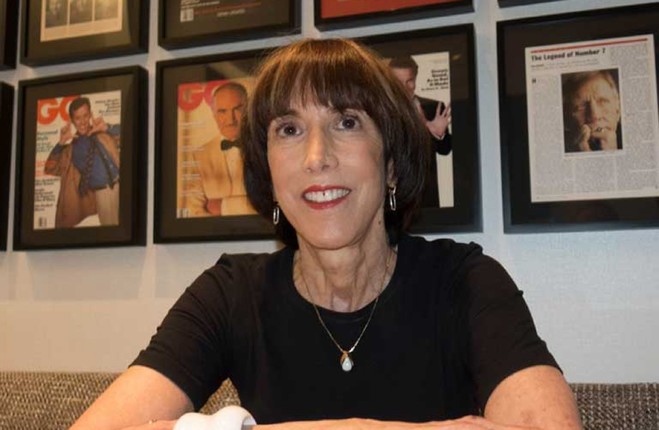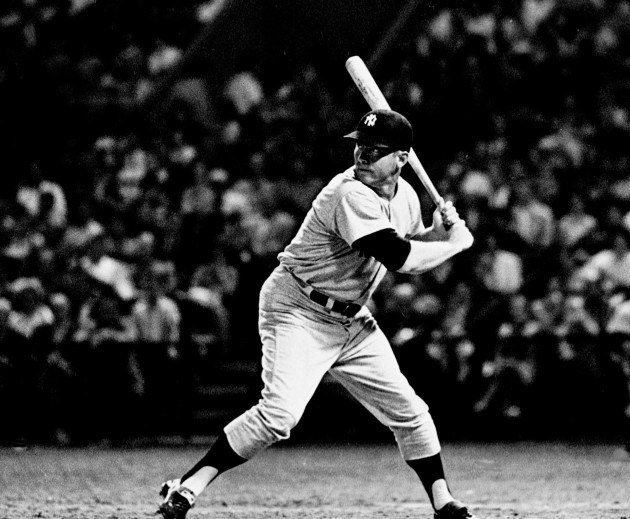DIANE K. SHAH told her career guidance teacher she wanted to be a journalist with either of the biggest weekly magazines of the era, Time or Newsweek.
Nope.
“Time and Newsweek each have about fifteen writers, all middle-aged, all men. What else would you like to do?”
“Then I want to be a sportswriter!”
“Dear, no editor will hire you. Sports reporters have to go into locker rooms, and girls can’t do that. I suggest you go home and start thinking sensibly about your future.”
She ended up writing about sport for Newsweek.
After that she flew west and became the first American woman to write a sports column for a daily newspaper.
Game, Set, and Match, Ms. Shah.
Diane is the guest on this week’s edition of Behind the Lines, our sportswriting podcast exclusive to members of The42.
(To sign up and gain access to a 38-episode back catalogue, go to members.the42.ie.)
That said, the career guidance teacher wasn’t entirely wrong when he said girls couldn’t enter the locker rooms of professional sport. Although Diane began working in sport from the late 1960s, the Women’s Liberation Movement hadn’t yet swept through the cordite of the stolid, good-ole-boy world of American sport.
When Diane applied to cover baseball games at Fenway Park in 1972, for example, the Boston Red Sox went fully Father-Dougal-around-nuns with her.
She was denied access to the field, told that players’ profanity meant it “was not the proper atmosphere for a young lady.” She was also denied access to the press box, told the last time a woman had been allowed in had resulted in “disaster.” (She had, eh, been hit on the shoulder by a foul ball.)
Her exclusion gained traction and was reported by local TV news along with the Boston Globe, and eventually, the Red Sox relented. Not that everyone behind the scenes at the Red Sox was thrilled at her admittance.
A member of the team’s PR department told her, “Because of you, the American family will be destroyed!”
“I failed”, straight-bats Diane.
She says she didn’t see herself as a conscious trailblazer but laughs at an interview with her that read, “On Diane’s narrow shoulders rest the hopes of all women.”
“I really just wanted to be another sportswriter doing her job.”
The Red Sox’ hysteria is at the lighter end of the sexism she faced in trying to do that job. Jim Rice, also of the Red Sox, grabbed her shoulder and tried to kiss her at the end of an interview – and, when rebuffed, refused to speak to her again – while there was another horrifying encounter with her childhood hero.
Diane was born in Chicago but her father was from New York and she assumed his infatuation with the Yankees. He revered Joe Di Maggio, so she heralded his successor, Mickey Mantle.
When she got a writing gig at National Observer she arranged an interview with Mantle, who was retired but had recently returned to take a coaching role with the Yankees.
A plan to interview him at Yankee Stadium fell through, so he told her to meet him at the St. Moritz Hotel at Central Park.
“I get to the hotel and I call, and he said, ‘Meet me in the bar.’
“He’s sitting at a table with a drink in front of him, well, half a drink in front of him; I think he’d had several already. I was so nervous. Back then, every interview I had ever heard anyone do with Mantle, the first question was always the same: ‘Hey Mickey, how are your legs?’ (He had bad legs.)
“That’s what I said, and he said, ‘Not so nice as yours’.
“I thought, ‘Okay, bad question.’
He was being very good in this interview but kept calling for more drinks. An hour or hour-and-a-half went by and we were still talking. I asked if any of his four sons would play baseball, and he said, ‘Maybe the eldest one.’ I then said something along the lines of, ‘How long have you been married?’, and he replied, ‘Too long.’
“Then he reached inside his jacket pocket, pulled out a greeting card and handed it to me. It had flowers on the front of it, and I was thinking maybe this is a card he is sending his wife.
“I opened it up and it said, ‘Wanna fuck?’”
She said nothing, handed the card back, and continued the interview. A couple of Mantle’s friends then arrived, and they all went for dinner. After they left the restaurant, a drunk Mantle slipped and fell on the kerb.
“I wrote, ‘For one split second, my hero was lying in the gutter.’
“It taught me an important lesson: never interview your heroes.”
She didn’t interrupt the interview when Mantle gave her the card, and nor did she mention it in her article.
“I let it go. I let a lot of things go. The only thing I cared about was, ‘Don’t get in my way. If you get in my way or threaten me physically, that’s a different story.’ Otherwise, I just tried to do my job.”
There were plenty of other instances of discrimination. Even when working as a well-known columnist in Los Angeles, the Raiders tried to keep her out of the locker room. She fought her corner, but rarely sought any back-up in fighting it.
“My attitude was, ‘I’ll figure this out myself. I am not going to my editor to dump a load of girl sportswriter problems on his desk’. I wanted to figure out the problem myself. Everytime I did it was such a feeling of empowerment.”
Should we admire her stoicism, or question a world which asked for so much of it?
“If I felt threatened, or my job was threatened, I would have gotten help. But in these situations, I sort of took it on as a challenge and I felt good. Like the times I talked my way into the locker room, I really thought that was cool.
“Did it have to be like that? It’s too bad it had to be like that…but it did.
“I got the impression that some of the athletes and the sportswriters talked behind my back, but I didn’t care. I wasn’t trying to be friends with the athletes, and the sportswriters were, for the most part, very helpful. I can’t remember a single writer being unkind. That didn’t mean they didn’t talk behind my back, but it didn’t bother me.
“I guess I just got lucky in some ways. Or maybe it’s how I presented myself.”
If you ask another woman who followed her into sportswriting, Sally Jenkins, this is how she presented herself.
“Diane would saunter through the locker room wearing Armani and a gold wristwatch, and she just radiated, I don’t need this fucking job.”
“Maybe she got it right”, laughs Diane.
To listen to the full interview, subscribe at members.the42.ie.


